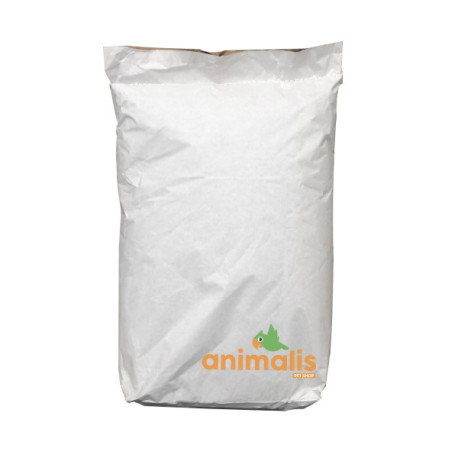- New






Reference: CARDI20KG
Cardi seed is rich in protein and linoleic acid, which helps lower cholesterol levels and therefore reduce heart disease. It is found in budgie and parrot mixes but also for native birds such as bullfinches.
Cardi seeds are high in fat. The amino acid proportions of the seed are very favourable, the arginine content is very high. The seed is low in lysine and methionine + cystine, while tryptophan is completely lacking.
Cardi seed is rich in protein and linoleic acid, which helps lower cholesterol levels and therefore reduce heart disease. It is found in budgie and parrot mixes but also for native birds such as bullfinches.
Cardi seeds are high in fat. The amino acid proportions of the seed are very favourable, the arginine content is very high. The seed is low in lysine and methionine + cystine, while tryptophan is completely lacking.
Paddy Rice 20kg - Versele-Laga
Paddy rice seed or raw rice that is very suitable for exotic birds with strong beaks such as padda and birds of Asian origin. This seed is also appreciated by parakeets, parrots and exotic doves.
The turnipseed is quite similar to rapeseed, with the difference being the more bitter flavour of the latter. Turnipseed is rich in protein and beneficial for enhancing singing, making it particularly interesting during the breeding season for canaries. However, as this seed is quite fatty, we recommend not exceeding 10% of your mix with turnipseed for colour canaries or posture canaries. For song canaries, turnipseed softens the song and can therefore be used at 30% of the mix: in this latter case, we recommend accompanying your bird's diet with liver support.
Basil 1kg
Basil contains many antioxidants, is anti-inflammatory, and helps against stress. This does not mean that basil is considered a medicine. Dried basil is of course also different from fresh basil plants. But the fact remains: basil is good for health.
High-quality raw material for pigeons and chickens.
Superior quality.
Deep cleaned repeatedly.
Dust-free.
The sunflower seed contains nearly 40% lipids, but also proteins, carbohydrates, and vitamins B and E. A sunflower seed contains approximately 600 kilocalories per 100 g.
It meets the needs of a wide variety of birds throughout the year, including the smallest among them.
Sunflower seeds are a real treat for our birds who love them!
Clover stimulates the immune system and slows down cellular ageing through its excellent antioxidant properties. Rich in vitamins B, C, E and provitamin A.
Flaxseed is rich in omega 3, which is essential for the cardiovascular system.
Chia is sage. It is an annual plant up to 1 m tall whose scientific name is Salvia hispanica.
The composition of chia seed closely resembles that of other mucilaginous seeds such as flaxseeds and psyllium. Unlike flaxseed, however, chia does not have anti-nutritional factors, factors that limit the use of flaxseed without prior hot treatment. Anti-nutritional factors are cyanogenic glycosides or linatins, inhibitors of vitamin B6 that prevent its action. Chia also has a much more pleasant taste than flaxseed and birds consume it more willingly.
Pine seeds are a good source of Phosphorus, Magnesium, Zinc, Manganese, Copper, Iron, Vitamin E, K, B1, B2, B3, B9.
The green Pagima ensures the good health of your birds. Pagima green promotes the functioning of the intestines, thus ensuring better digestion. Pagima is also credited with a preventive action against inflammations of different types that threaten your birds, it is rich in vitamins and fiber, its smell is pleasant and its taste delicious.
Baked and crumbled wheat biscuit.
Rusk is particularly suitable for the absorption of moistened food.
Also ideal for mixing additives (vitamins, dyes, etc.) in food products
Ideal for moistening egg pie.
Composition: wheat, water, salt and yeast.
Carrot seeds are very rich in vitamins with a high proportion of vitamin A and carotene, as well as vitamin B, calcium and valuable carbohydrates.
Canary seed is a grass, an annual plant that can reach up to 1m in height, with seeds found in the inflorescences. These seeds make up a significant portion of most bird seed mixes.
• Excellent for canaries, European and exotic birds, budgerigars, and large parakeets.
• EXTRA canary seeds have undergone additional cleaning and are of exceptional quality. Unique on the market!

Cardi seed is rich in protein and linoleic acid, which helps lower cholesterol levels and therefore reduce heart disease. It is found in budgie and parrot mixes but also for native birds such as bullfinches.
Cardi seeds are high in fat. The amino acid proportions of the seed are very favourable, the arginine content is very high. The seed is low in lysine and methionine + cystine, while tryptophan is completely lacking.
